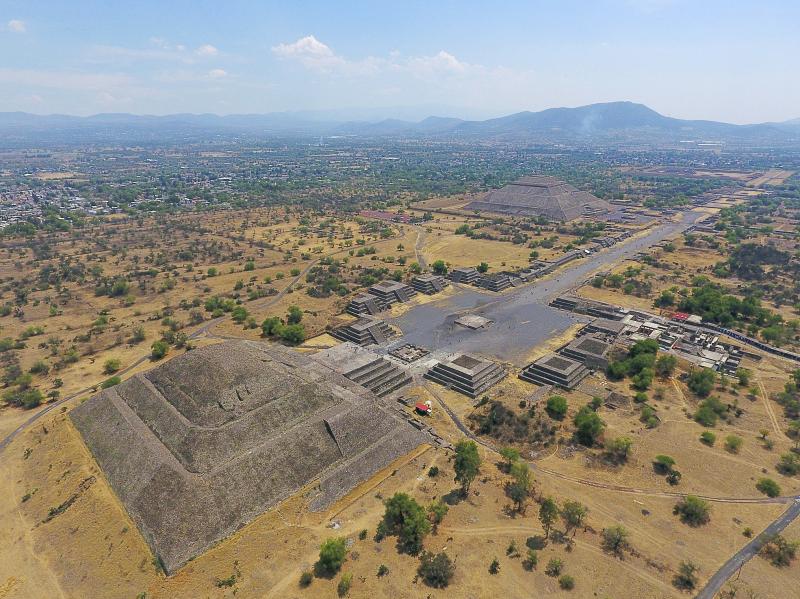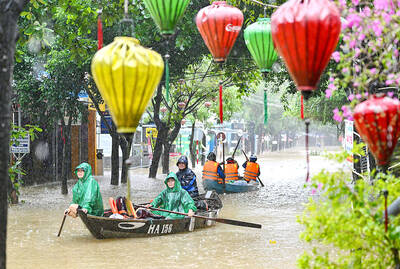The Mexican government on Tuesday said that a private building project is destroying part of the outskirts of the pre-Hispanic ruin site of Teotihuacan, just north of Mexico City.
The Mexican Secretariat of Culture said that it has repeatedly issued stop-work orders since March, but the building crews have ignored them.
The secretariat estimated that at least 25 ancient structures on the site are threatened, and it has filed a criminal complaint against those responsible.

Photo: AP
Apparently, owners of farm plots are trying to turn the land into some sort of amusement park. The area is just outside and across a road from the site’s famous boulevard and pyramid complex.
The UN International Council on Monuments and Sites said that bulldozers threaten to raze as many as 7 hectares at the site, which is a protected area. The council added that looting of artifacts had been detected.
“Teotihuacan is an emblematic site declared as World Heritage by the UNESCO, that represents the highest expression of the identity of the people of Mexico,” the UN council said in a statement.
Mexico has long been unable to enforce building codes and zoning laws or stop illegal construction, in part because of the country’s unwieldy, antiquated legal system.
The destruction so close to the capital raises questions about Mexico’s ability to protect its ancient heritage sites. Teotihuacan is the country’s most visited archeological site, with more than 2.6 million visitors per year, and it has hundreds of smaller, more remote and often unexplored sites.
Teotihuacan is best known for its twin Temples of the Sun and Moon, but it was actually a large city that housed more than 100,000 inhabitants and covered about 20km2.
The still mysterious city was one of the largest in the world at its apex between 100 BC and 750, but it was abandoned before the rise of the Aztecs in the 14th century.
Even its true name remains unclear. Its current name was given to it by the Aztecs.
However, the Aztecs might have called the city “Teohuacan” — literally “the city of the sun” — rather than Teotihuacan, which means “city of the gods” or “place where men become gods.”
The Pyramids of the Sun or Moon used to draw tens of thousands of visitors for the spring and fall equinoxes each year, before the COVID-19 pandemic hit.

With much pomp and circumstance, Cairo is today to inaugurate the long-awaited Grand Egyptian Museum (GEM), widely presented as the crowning jewel on authorities’ efforts to overhaul the country’s vital tourism industry. With a panoramic view of the Giza pyramids plateau, the museum houses thousands of artifacts spanning more than 5,000 years of Egyptian antiquity at a whopping cost of more than US$1 billion. More than two decades in the making, the ultra-modern museum anticipates 5 million visitors annually, with never-before-seen relics on display. In the run-up to the grand opening, Egyptian media and official statements have hailed the “historic moment,” describing the

‘CHILD PORNOGRAPHY’: The doll on Shein’s Web site measure about 80cm in height, and it was holding a teddy bear in a photo published by a daily newspaper France’s anti-fraud unit on Saturday said it had reported Asian e-commerce giant Shein (希音) for selling what it described as “sex dolls with a childlike appearance.” The French Directorate General for Competition, Consumer Affairs and Fraud Control (DGCCRF) said in a statement that the “description and categorization” of the items on Shein’s Web site “make it difficult to doubt the child pornography nature of the content.” Shortly after the statement, Shein announced that the dolls in question had been withdrawn from its platform and that it had launched an internal inquiry. On its Web site, Le Parisien daily published a

UNCERTAIN TOLLS: Images on social media showed small protests that escalated, with reports of police shooting live rounds as polling stations were targeted Tanzania yesterday was on lockdown with a communications blackout, a day after elections turned into violent chaos with unconfirmed reports of many dead. Tanzanian President Samia Suluhu Hassan had sought to solidify her position and silence criticism within her party in the virtually uncontested polls, with the main challengers either jailed or disqualified. In the run-up, rights groups condemned a “wave of terror” in the east African nation, which has seen a string of high-profile abductions that ramped up in the final days. A heavy security presence on Wednesday failed to deter hundreds protesting in economic hub Dar es Salaam and elsewhere, some

Flooding in Vietnam has killed at least 10 people this week as the water level of a major river near tourist landmarks reached a 60-year high, authorities said yesterday. Vietnam’s coastal provinces, home to UNESCO world heritage site Hoi An ancient town, have been pummeled by heavy rain since the weekend, with a record of up to 1.7m falling over 24 hours. At least 10 people have been killed, while eight others are missing, the Vietnamese Ministry of Natural Resources and Environment said. More than 128,000 houses in five central provinces have been inundated, with water 3m deep in some areas. People waded through